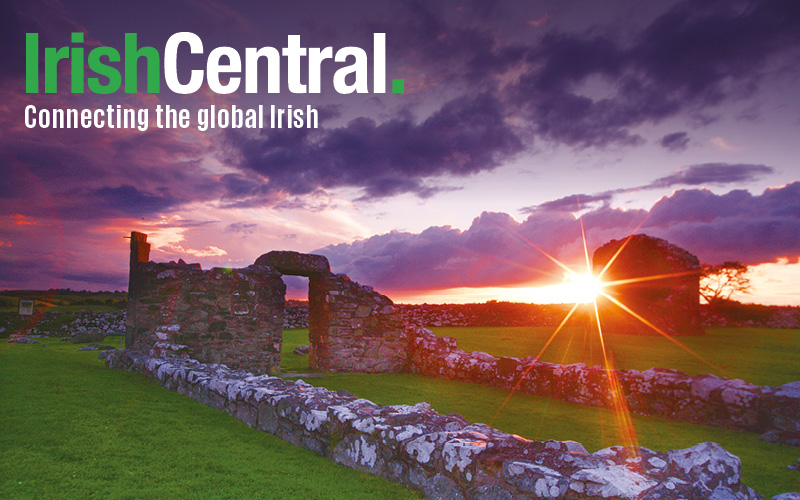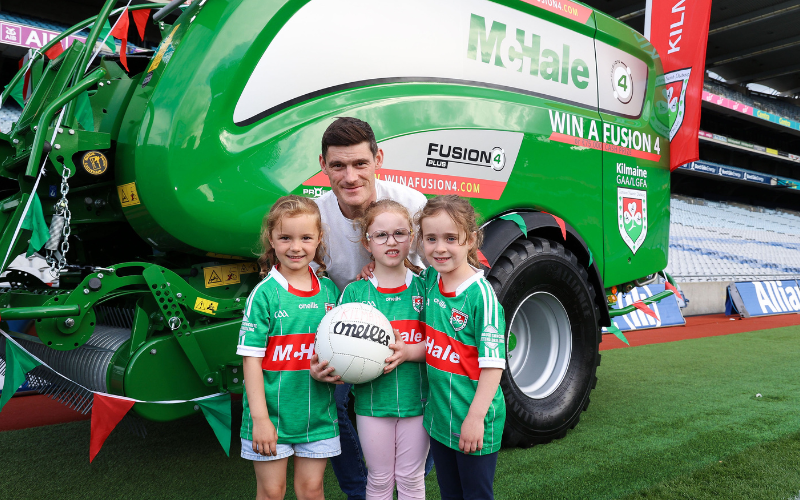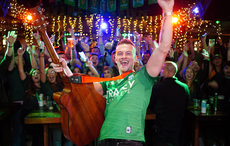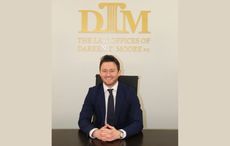Don Keough thinks Ireland should have a Diaspora Minister, saying it would transform Diaspora/Irish relations.
He also wants to see Notre Dame back in Dublin playing football in the next couple of years. Tourism leaders will surely salivate after 30,000 US fans showed up the last time they played.
He has just helped raise $3 million for a world class 1916 Rising documentary prepared at Notre Dame and already bought by RTE Public Television in the US and the BBC.
He also believes that Ireland faced the worst crisis any western government had after the economic collapse and that American business leaders are keenly aware of how well they have handled it.
He is the man who brought Notre Dame and Coca-Cola to Ireland. He also brought Bill Gates and Warren Buffett his lifelong friend too, hosting them at the K Club on their first ever visit. He serves on Berkshire Hathaway’s board with Buffett and is still an advisor to the board of Coca-Cola, the company he served for 40 years.
As president of Coca-Cola he blazed the multinational trail to Ireland in the 1970s. As Chairman of the Board at Notre Dame he created the Keough-Naughton Irish Institute in 1994 and their Dublin campus and laid the groundwork for the university to play in Dublin in September 2012.
At 86 he is far from a back number. He is Chairman of the Board of Allen and Company, the New York investment bank, and co-hosts their annual Sun Valley retreat attended by world business leaders such as Mark Zuckerberg, Bill Gates, Rupert Murdoch.
He divides his time still between New York and Atlanta, his home, and keeps a schedule a younger man would surely tire of. Every year he visits his beloved Ireland with his family and recently paid a visit to New Ross in Wexford and the famine-era replica ship like the one his great-grandfather Michael embarked on back in the 1840s.
He has come a long way from Michael’s lonely journey. Warren Buffet once stated that two men he met in business, Jack Welch and Don Keough, could have become president of the United States if they had chosen a political rather than a business career.
Keough demurs, but there is little doubt that he has been Ireland’s greatest advocate in America for decades now. His sense of the potential of the Diaspora was uppermost in his mind during our New York interview.
How would you approach the Diaspora if you were the Irish government?
If a person wants to be part of that Diaspora the Irish government needs to acknowledge that. A good start would be a Minister for the Diaspora, who would be charged with creating that welcome and outreach.
I know when you become an Irish citizen in Ireland there is an event around it. If you announce you are of the Diaspora and coming to Ireland that is important too.
Israel has a minister of the Diaspora, I read in the New York Times, where and I quote, “Over the next five years the Israeli government will spend $1.4 billion on a range of initiatives to strengthen Jewish identity abroad and Jewish connections to Israel and vice versa.” That is the kind of thinking we need.
There should be someone as Minister who is a constant part of the Diaspora, who is reporting back to cabinet.
It is an asset that needs to be used. Just to announce that minister would be huge all over the world.
I was delighted to see Irish President Higgins mention and dedicate his trip to the Irish Diaspora in Britain in his remarks during the state visit.
We are everywhere across this world, this Irish army waiting to help this small country their people left from.
Think of it – 70 million people worldwide, millions of whom are seeking a relationship with their ancestral home. What an opportunity!
If the Notre Dame game can bring 35,000 people to Ireland what could a massive outreach do? The Notre Dame game demonstrated what was possible. It was the ultimate power of the Diaspora that they didn’t just come to the game – they captured the country.
I was at church last week in Atlanta. A couple who came to the game came up and told me they were returning again, they fell utterly in love with Ireland. They are just one small example of what I’m saying.
What is the upside potential for the Diaspora do you think?
I think within a matter of five years you would double the number of people who would visit Ireland. That would be my goal.
It needs preparation; Diaspora packages need to be put together. A self-proclaimed member of the Diaspora should feel like Notre Dame fans do, part of something bigger, greater than the sum of its parts. There should be special discounts, meetings, and outreach.
Look what we did with Notre Dame – 35,000 came and there was a massive range of activities.
The visit to Ireland is always enjoyable, despite the weather sometimes. Ireland and what it continues to represent is the best argument for itself.
What brought you there first to your Irish roots?
Well, I wanted to bring my children to Ireland. My father had gone late in his life and he was deeply moved by it. I’ll never forget how proud he was to go.
It was the memory of my father. It was the happiest trip of his life, and he said he was so upset he didn’t go when he was younger so that was always on my mind. So the first time I went was when I could afford it. My father touched Ireland for me.
I brought my children and we drove everywhere. This was the early 1970s. I was so excited. I wanted to get involved. I remember years later reading your magazine Irish America and saying, finally, someone gets it.
You first created the links between the University of Notre Dame and Ireland. There was very little connection until you came along. What made you want to do it?
Well, Notre Dame had an extraordinary Irish background. Almost all the presidents had Irish connections. It was just waiting to be connected into Ireland.
What made me do the Keough-Naughton Irish Institute was Professor Chris Fox, who I had met, and he told me we had an amazing Irish collection of books and major historical links and he had a deep interest in Ireland. I said, “Why don’t you do something?” Then the issue was how do we get it started.
He had the man, that great scholar Professor Seamus Deane who was being sought by Harvard and many other places and was deciding. I said to Chris, “Please go tell him I’d like to talk to him.”
So I talked to Seamus and said, “You have some amazing ideas about what an Irish studies program should be like we’ll give you the blank canvas and the paints and you paint the Irish studies program you want at the home of the Irish in America.” By golly, that was what exactly he did.
One of the most exciting things in my life has been to see it develop the way it has. It was perfect timing and Chris was a great leader, and the university supported it totally.
Some 10,000 students have studied there in the past 20 years and thousands go to Ireland. Then Martin Naughton came on board as my partner. He has been amazing.
Martin and his family played a massive role in the success of Notre Dame game. It became a happening because of Martin and it was great that the Taoiseach was fully involved, and we even got the weather!
I always remember telling Martin about the idea of the game and really getting the Irish involved. He asked, “What took you so long?” It was a huge boost to the institute and we have enlarged our efforts and numbers in Ireland since.
I wouldn’t be a bit surprised if the entire Notre Dame commitment has meant over $100 million in terms of everything in recent years
You have a great new Irish project as well.
Yes, the 1916 landmark documentary series. BBC, RTE and PBS will show a three-part landmark documentary about the 1916 Rising and we have raised the money, almost $3 million for it. We are very excited about that. The series will run to coincide with the centenary of the Easter Rising.
What has Ireland meant to you overall?
Ireland has been one of the greatest experiences of my life. To have such an involvement there is a privilege. My family loves it and we have all spent amazing times there. I wanted to buy a house there, but my wife Mickie said I’d never leave it.
How is Ireland doing now in your opinion?
There were very tough times these past few years; this bubble burst caught Ireland more so than almost anywhere else in the world. Everyone thought the Celtic Tiger would go forever. The banks had been captured by the developers and a lot of people lost money in a hurry
So the Kenny government had no easy way to solve the problems, and so they had the toughest job of any country in the world.
They have done well. You hear a lot of respect for Ireland now over here. They faced the toughest problems and were the first to demonstrate that they were working their way out of it.
I look on what happened with a lot of pride on how they have done it. It has been very tough on the Irish people I know, but you have to give them credit. I’m very optimistic about what is going to happen. A lot of smart Americans are getting involved there now, guys like John Malone.
Will you bring Notre Dame football back to Ireland?
It is not up to me but my own view is they will be back. The call to Ireland for Notre Dame is very strong. Maybe within the next couple of years.
Are you still bullish on US?
When I talk about the US I say never bet against it, these are the most resilient people in the world.
We have an amazing gene pool a collection of people from all over the world who came not to exploit but to find a new way to grow and develop, many of them were running away from poverty and oppression.
They could see hope here those that came. It took enormous courage for people to get up and leave in the first place.
I’m an absolute optimist; my own journey proves it from a small farm in Iowa to the presidency of Coca-Cola.
Who do you consider inspirational figures?
Father Ted Hesburgh at Notre Dame. He is an absolute inspiration; still a simple priest. His most important moment in his life is when he says Mass.
I took him to Latin America once. We called on several heads of state. The minute I brought him in there they paid no attention to me. He spoke to them in Portuguese, Spanish and charmed them all.
He was an incredible visionary who served six presidents on issues such as civil rights and immigration and built one of the great universities. There were those who said a Catholic university could never reach the heights of academic excellence, but Father Hesburgh knew differently.
Warren Buffet still tap dances to work every day. He has arranged to give all his wealth away, but he’d be rich in every important way with or without it.
He lives a very simple life. We have been friends for decades. I lived across the street from him in Omaha many years ago and he still lives there, in a modest house, like the man.
Outside of my own father, of the people I have worked with Warren Buffett stands out. He is a learning machine, a great philanthropist. He has kept an amazing sense of humility.
What is the best life lesson you have learned?
The life lesson I have learned is that wealth has nothing to do with money. It has to do with family, with friendships, with knowing and learning from interesting people, people who make a difference. If I didn’t have ten dollars I’d consider myself one of the wealthiest people in the world with the friends and family I have had.
I say to my grandkids, you need to be an interesting person, and not just learn how to move your thumbs around an iPhone or iPad. No one wants to be around uninteresting people I tell them. Young people today don’t want to be vulnerable. They want to be cool, the worst possible thing to be.
I tell them you need to go through life saying this is who I am comfortable in my skin, for better or worse. Take me for what I am.




Comments